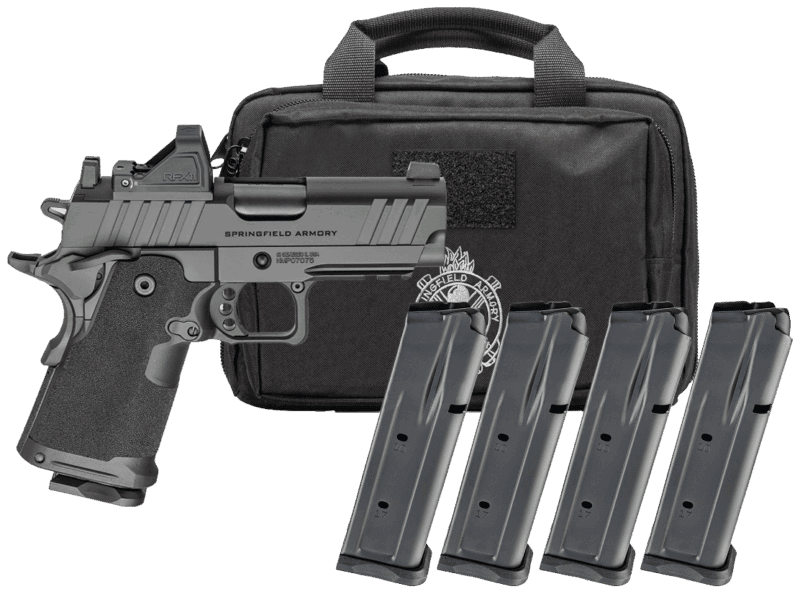Training Beyond Your CCW
May 3rd, 2019
4 minute read
When it comes to the world of concealed carry and firearms, the types of people it encompasses are vast. There are some who have been raised around firearms their entire lives. Others have zero clue which end of the gun goes boom but have a desire to learn and protect themselves.
The one common factor among all who desire to carry is desire. If the desire is there, the willingness to learn isn’t far from it. That is where training comes in.
Minimum Training Standards
Most people with the desire to carry concealed understand that to do so requires a license or permit in many jurisdictions. To obtain a license in some jurisdictions, a gun owner must take a class and test.
In these areas, the gun owners go through the training hours mandated by their state and once they pass the test they present their certificate to obtain their CCW. Just like that, they can now legally carry a firearm.
A common misconception at this point is that that’s the end.
The hours spent to obtain the permit are considered “training” and many gun owners feel confident with this minimum amount of training. After all, the state has given them a license, so it must be enough.
The truth of the matter is that it’s simply not enough.
Beyond the Basics
Going beyond your CCW course training and advancing through continual training is much like a baby leaving milk for solid food. Ultimately, we just need more. More training is required to truly understand how to run your gun and obtain the right mindset.
Shooting your gun is not like riding a bicycle. It is not something that you can do sporadically and come back to right where you left off, never having forgotten.
Shooting is a perishable skill. Additional and ongoing training is so beneficial and necessary when you carry a firearm.
The reason we carry is for self-defense. If a threat were to happen upon us and we are required to pull our firearm we need to be prepared physically, mentally, and emotionally. The only way to ensure confidence, proper gun handling and the ability to utilize required critical thinking/decision-making skills is to seek further training.
Finding a firearms training program is not difficult. You can jump onto any social media platform and be inundated with training classes, trainers and specific groups. So much so that it could be overwhelming.
It’s easy to fall prey and become awe-struck with appearances. “If I do this training I can become a tactical hero!” We must be able to sift through the masses.
What Kind of Training?
To truly ascertain what type of training we need and why. Most of us do not live a “Tactical Life.” We are carrying our firearm for self-defense and therefore need in-depth defensive handgun training. I am not in any way disregarding training that is tactical. Such classes certainly have their purpose.
What we need to ask ourselves though, is this: Is that purpose relevant to my daily life and activities? Outside of law enforcement, military and any other occupations that could put you in a situation where you work daily with your gun, most of us simply carry daily and maybe visit the range once a month or less to actually shoot.
A good defensive handgun course will focus on these key elements. These are generalized components you should look for, not a full course description.
- Situational Awareness. Teaching you the importance of understanding and being dialed into your surroundings. How to scan your environment and be able to distinguish a possible threat. The fundamental importance of getting away, or how to keep distance if there is no out. The best defense is a great offense.
- How to truly run your gun. Safety in handling and carrying. Ability to draw from the holster and quickly acquire the threat. Moving and shooting, shooting from cover, multiple targets as well as disadvantageous positions. Identify the different malfunctions along with how and when to perform clearances. Reloads, what types and when and how to utilize them. How to obtain quick sight acquisition and hit your target. What type of ammunition to use for carrying vs. training and why.
- Mindset. What happens mentally and emotionally if you were ever thrust into a situation that required you to utilize your firearm.
- Additional training. Give you drills and information to walk away with. A plan of continued action that you can take to the range and utilize so that you may train effectively and not just static shooting — not simply putting round after round downrange.
Training should be conducted by a professional trainer. Perception is everything. Go deeper than the perceived image a company or trainer is trying to project. Anyone can adorn a cool name and list their abilities.
Ask questions. Where did they acquire their experience and how has it been applied? Find out who they have been associated with and research what those people have to say. This is your money and your time that you are spending. You have the right to research and verify credentials before you spend either.
I suggest checking out Richard Johnson’s article on finding the right firearms trainer. He has some great insight and covers the topic completely!
What Gear Do I Take?
So, once you find the instructor you want to work with, what equipment will you need to take?
Quality instructors will have a list of recommended (and mandatory) things to bring with you to class. However, there are some basics that are common across most classes. Michelle Cerino explains what you should be loading in your range bag for firearms training in her article on the topic.
On Your Own
While it is difficult to improve your shooting without a professional trainer to guide you and spot your errors, you can certainly practice on your own. Shooting drills can keep you sharp between training courses and prevent those hard-earned shooting skills from dissipating.
Andy Grossman put together a great list of shooting drills to improve your speed and accuracy with a handgun. I recommend reading it and trying at least one of the skill drills he outlines.
Once we understand the purpose of why we carry and recognize what our individual needs are, we can then find what program and trainer will suit us best. Once we continue to train we, will begin to see and understand just how important it is to train beyond your CCW.
Join the Discussion
Continue Reading
Did you enjoy this article?

 156
156






